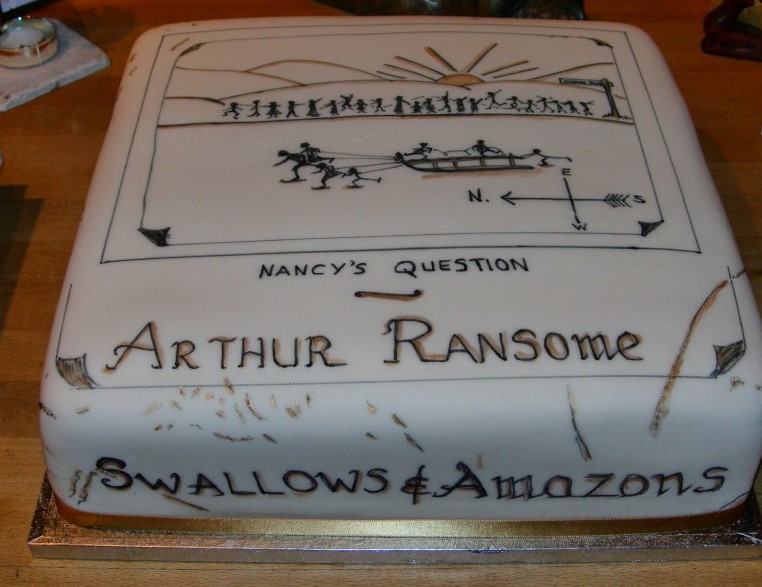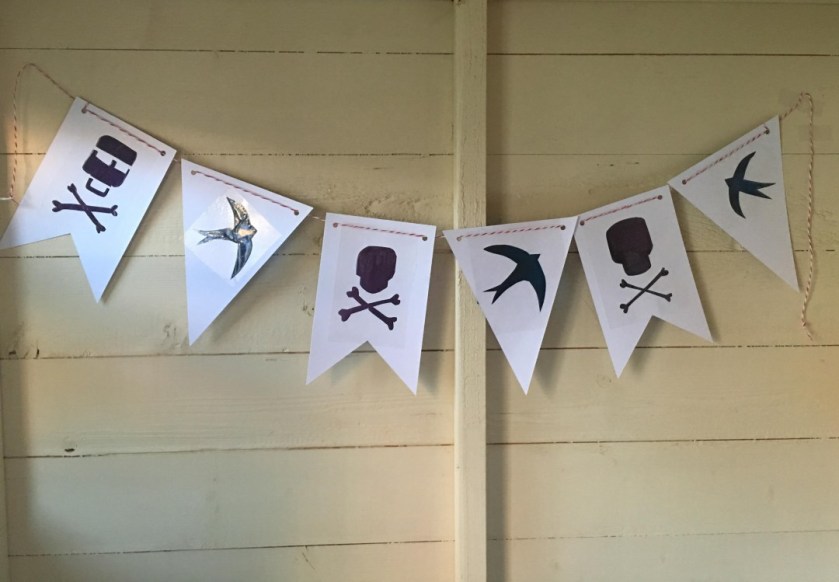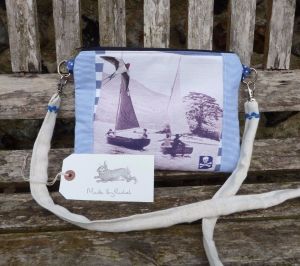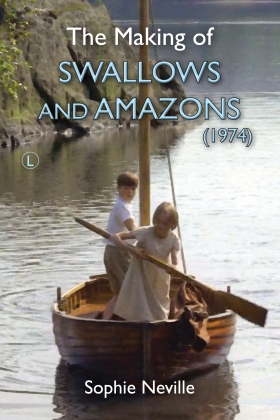An article first published in Mixed Moss, the journal of The Arthur Ransome Society:

‘I can’t see it.’ The man was standing in the rain outside the cinema. ‘You said Swallows and Amazons has parallels to missionary life but I don’t get it.’ He was a vicar, camping with his family in the Lake District. After spending a week at the Keswick Convention, he’d brought his children to see the original film Swallows and Amazons (1974) at the Alhambra cinema where I was giving a Q&A after a screening of the movie.
‘I once went on a short-term mission to Australia,’ I told him. ‘People would ask me if I was going to convert the natives.’ The archaic idea of berating aboriginal people almost filled me with horror but use of the word ‘natives’ reminded me of Swallows and Amazons. This led me to consider how deeply Arthur Ransome was influenced by missionary journeys of the early 1900s. As the author, Julian Lovelock points out, ‘exploring, trading and being a missionary were, in Victorian times, all shades of the same colonial activity. Dr Livingstone is often described as an ‘explorer-missionary’. This is the 80th Anniversary year of the publication of Secret Water where ‘missionaries’ enter Ransome’s world in their ‘mission ship’ Lapwing.

Linda Hendry, of The Arthur Ransome Society (TARS), observed that as a boy of ten, Arthur envied his Aunt Edith and Aunt Jessie who were going off to China as missionaries. Did this idea of adventures last with him?
Although his father, Cyril Ransome, came from a clerical background and ensured Arthur received a biblical education in Windermere, Margaret Ratcliffe of TARS reports that ‘there is never a hint of spirituality’ in his letters and diaries. ‘Arthur and Genia were not of an active religious persuasion; Christmas and Easter were ordinary days for them.’ The only time he went to church on a regular basis was when he lived in Finsthwaite and his closest fishing friend was the vicar, the Rev. Roland Pedder. ‘Arthur Ransome never mentions that they discuss spiritual matters, rather hooks, bait and water levels.’ I agree with Margaret’s view that any analogy ‘would have been subliminal on his part, rather than conscious’ but it is embedded in the story, all the more interesting for being unintended.

The reality of going on overseas missions does have parallels with Swallows and Amazons. You tend to set off as a group or family, like the Walker children, and usually end up helping people who need a bit of support, even if it is not what you might expect. Those once wounded often make the best doctors.
One of the key themes, perhaps driving force behind Swallows and Amazons is fatherlessness. Is the story an out-working of Arthur Ransome’s grief for his own father, who died when Arthur was thirteen? Was he desperate to prove himself as reliable and resourceful as Captain John, planning the expedition while Commander Walker was in Malta preparing to sail to Hong Kong? As it is, the Swallows gain Daddy’s permission while remaining under the umbrella of their mother’s care, making sensible preparations before setting sail. This is very like missionary groups who usually need permission from the church with back-up and support from their mission organisation.
Peter Wright, chairman of The Arthur Ransome Society, added, ‘The Amazons seek out the Swallows in much the same way as indigenous people came to find out about early explorers.’ Any number of missionaries have had arrows fired at them. The Swallows discover that Nancy and Peggy not only prove to be the same age but share their terminology and outlook on life. They too have no father around and have recently been rejected by their uncle who is busy writing. As a result, they are being rebellious and let off a firework on the roof of his houseboat. The Swallows make friends with the Amazons and end up helping Uncle Jim to see sense.

Everyone’s moral values are tested in Swallows and Amazons. Uncle Jim realises he has been neglecting his relationship with his nieces and sees what ‘a cross-grained curmudgeonly idiot’ he’d been to ever doubt John Walker’s integrity. Although this casts a shadow on idyllic island days, it almost visibly builds John’s character before his leadership skills are stretched by challenges set by Nancy. The other characters use their gifts to the full, Susan becoming the practical facilitator and Roger learning to be helpful. Titty is the one keen on diving for fish like a cormorant. She keeps the journal or ‘ship’s log’ and takes guidance from the Christian novel Robinson Crusoe that, ‘tells you what to do on an island’, being well-aware that missionaries could be eaten by cannibals. Although her active imagination is undervalued at first, she comes up with ideas that prove vital.
When the Swallows meet indigenous people of the area such as the charcoal burners, they are both polite and respectful, taking an interest in traditional beliefs, such as keeping an adder under the bed for luck. Although Roger makes a bit of a gaff, saying Old Billy ‘doesn’t look much like a son’, the others take an interest in ‘savage’ language and culture.
The Swallow’s mother looks out for them constantly. She reprimands John and sets rules when he goes too far, ‘No more sailing at night’, but continually ensures they are provisioned and their needs met. It might not be expected, but there are battles to be won on the mission field. They are usually tricky, demanding timely action and often involving discomfort akin to sleeping in a dinghy moored by Cormorant Island. Interestingly, it is Titty, the littlest girl, who finds the strength and courage to also unearth the buried treasure and bring restitution.
‘What did the burglars do when they found the treasure had gone?’ one little girl at the cinema asked?
Quick as a flash, Marc Grimston of TARS EAST, who was in the audience, said, ‘Captain Flint carves a fish for them to find instead of the trunk.’ Repentant and forgiven himself, Jim Turner opts to convince the thieves of their guilt rather than report the burglars to the police.
The great thing is, that whilst fishing from boats and weathering the storm, firm friendships are forged that take the Swallows and the Amazons on further adventures, even to the ends of the Earth. There is something inspirational about these that stories lead others to extend themselves, hoist their sails and live life to the full.

You can’t go out as a missionary expecting to convert the natives. You need to come alongside people who are hurting, find the key to their needs and help them use their God-given ability to fulfil their dreams. It can be scary and things won’t always go smoothly but you are usually warned of danger. There will be a need for strong leadership when times become testing but it should be fun. If you can gain people’s trust and hold on to the unity there will be celebration and feasting in the end.

The vicar, standing in the rain beside his bicycle, began to appreciate the parallels. You may find more. One thing is certain: there is something about the Swallows and Amazons series of books that enables adults to enjoy them as much as children. We can escape pressures of contemporary life and are inspired to fulfill our dreams, becoming all the good Lord wants us to be, doing all the things He has prepared us to do.
You may disagree completely, you may can find parallels in other Arthur Ransome books. Please write in, using the comments box below.
Duncan Hall of the Arthur Ransome Group on Facebook wrote: ‘Of course, throughout (the series of Swallows and Amazons books) there are references to fictional and non-fictional adventures of exploration and discovery which historically sat with Empire, missions and trade as well as with piracy, etc. They do contrast with a political outlook that is clearly oppositional to those traditions. We always end up being impressed by savages (in the Lakes or the Walton backwaters) rather than hoping to civilise them. In Missee Lee, we obviously want to protect the location of the Three Islands, rather than send Daddy’s gunboats over there (despite the pretty monstrous business that Miss Lee presided over, we are convinced that the Brits destroying their way of life would be more monstrous still).
































 Sophie Neville who in 1973 played Titty Walker in the EMI movie of ‘Swallows & Amazons’ dressed up to face the Scottish weather
Sophie Neville who in 1973 played Titty Walker in the EMI movie of ‘Swallows & Amazons’ dressed up to face the Scottish weather








































